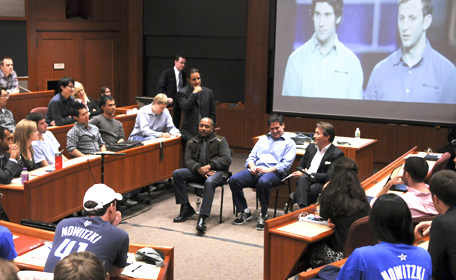TV’s “Shark Tank” Panelists Share Their Wisdom with HBS Students
 HBS students surround the sharks (LtoR) Daymond John, Mark Cuban, and Robert Herjavec.
Photo: Neal Hamberg HBS students surround the sharks (LtoR) Daymond John, Mark Cuban, and Robert Herjavec.
Photo: Neal Hamberg
BOSTON—Since 2009, Harvard Business School students have flocked to Associate Professor Noam T. Wasserman's second-year elective, Founders' Dilemmas, which he designed for MBA candidates who plan to become involved in new high-potential ventures in one way or another, from founders and investors to board members and hires. In 2011, Inc. magazine named Founders' Dilemmas one of the top entrepreneurship courses in the country. "We tackle the problems that are faced by almost any founder, no matter what industry they are in, no matter what country they are in, and no matter what time frame they are in--boom or bust," Wasserman said. "We help them anticipate and avoid the hidden pitfalls and the unexpected bumps." Wasserman teaches two sections of the course, while Senior Lecturer Janet J. Kraus teaches the other. They divide the course into four parts that address timeless entrepreneurial dilemmas: deciding when to found a company, building the founding team, dealing with investors and successors, and maintaining control after building a valuable venture. Raising money often involves making a pitch before professional investors. To provide some insights and perspectives on the best way to do that, Professor Wasserman and Professor Deepak Malhotra, who teaches negotiation, recently invited three "sharks" from the hit TV show Shark Tank to run a pitching workshop and answer questions from students in an overflowing Aldrich Hall classroom. The sharks who made their way to the HBS campus in Boston were Mark Cuban (owner of the Dallas Mavericks and owner and chairman of HDNet), Robert Herjavec (a high-tech entrepreneur who now heads a leading IT security firm in Canada), and Daymond John ("the godfather of urban fashion" who founded the FUBU clothing line). Students were shown four segments from an episode in which two young entrepreneurs pitched their company, OrigAudio, which sells low-cost audio speakers. In the episode, Mark Cuban showed interest and offered an ultimatum, demanding that the entrepreneurs make a decision to accept his offer within 24 seconds (the time allotted to National Basketball Association players to make a shot) or he was out. The result: no deal. Real estate mogul Barbara Corcoran said she was interested and would add further value by bringing in a colleague with considerable marketing experience. Daymond John made an offer for 100% of the company for $300,000. However, Robert Herjavec, who thought highly of the two entrepreneurs and was intrigued by the product, ended up clinching a deal for a 15 percent stake in the venture for $150,000. Students analyzed and critiqued the founders' pitch and probed the panelists on the thinking behind their decisions. They also picked up pointers they can use when they put the course's precepts into practice:
For more information about the challenges of entrepreneurship, please see Professor Wasserman's upcoming book, The Founder's Dilemmas: Anticipating and Avoiding the Pitfalls That Can Sink a Startup. |
Zeenat Potia
617-495-6156
zpotia+hbs.edu
About Harvard Business School
Harvard Business School, located on a 40-acre campus in Boston, was founded in 1908 as part of Harvard University. It is among the world's most trusted sources of management education and thought leadership. For more than a century, the School's faculty has combined a passion for teaching with rigorous research conducted alongside practitioners at world-leading organizations to educate leaders who make a difference in the world. Through a dynamic ecosystem of research, learning, and entrepreneurship that includes MBA, Doctoral, Executive Education, and Online programs, as well as numerous initiatives, centers, institutes, and labs, Harvard Business School fosters bold new ideas and collaborative learning networks that shape the future of business.
